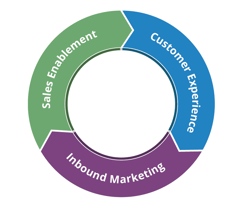Your prospects want to buy from brands they can trust. PwC found that 43% of potential B2B buyers say that trust in a brand is one of the top three reasons for choosing a brand to do business with in the future.
If your primary source of customer interaction is your website, you have to use that space to show your customers who you are and why you’re trustworthy. And telling prospects that they should trust you isn’t as powerful as showing them. Content marketing is how you show rather than tell. The Content Marketing Institute’s (CMI) research found that 96% of the top-performing B2B marketers say they have built trust with their audience through content. But how can you start writing helpful, trustworthy content that builds a relationship with your audience?
-
Emphasize Helping Over Selling
One of the core tenets of a great content marketing strategy is that you can’t make your content all about you. CMI’s research found that 90% of the most successful businesses say they put their audience’s needs first when marketing content. It's not about creating content to sell but creating content to help. If the only message your audience sees from you is pushing a sale, you’re not giving them any reason to trust you and view you as a valued resource in their decision-making process. But when you commit time and resources to create helpful content, you show them you care beyond the bottom line. -
Create Content That Shares Pros and Cons
This tip may seem counterintuitive, but creating content that shows who you are and is not a good fit is incredibly powerful for a buyer. When you are upfront about this, especially in B2B, you build trust by sharing exactly who should continue the buyer's journey and who should not. This type of content saves time for your prospect and your sales team by not having to follow up with prospects who aren't a good fit. -
Share Comparison Content
When you start to do comparative research for your prospect, you save them time by creating an unbiased resource and providing the information they need to begin the decision-making process. For example, you can write a blog about your brand vs. a competitor's. While this may seem like promoting your competitor, it's just helping the buyer through the process. The information you would share in this type of content is already content that exists on your competitor's website. You're just making this process more seamless for your prospect and becoming a helpful resource for their decision-making process. Pro Tip: It can even help you rank for keywords your competitor may be targeting because you're speaking specifically about them on your website. -
Demonstrate Your Expertise
People want to work with experts. Especially when you are a B2B marketer, building trust and showing your skills will help you stand out. Share your thought leadership content, industry tips, and ways to make the prospect's job easier. These are all things that help make you a thought leader in your space and build that brand trust to help your prospects. -
Talk About the Negatives
Everyone wants to know why something won't work or why you're not a good partner for them. So it's time to start sharing that information so it's easy for people to find it. For example, when I speak with prospects looking for inbound marketing services, they always ask me what instances this program won't work. I'm honest with them and share the scenarios where inbound marketing wouldn't succeed. They appreciate that, and it builds trust instead of saying it will work 100% of the time (because nothing will work 100% of the time). If you discuss the negatives, you build brand trust and become an advisor in the prospect's decision-making process.
There are many ways to build trust with your audience. Always think about the prospect first and the content that will be most meaningful for them. It's not about selling your product but being a trusted resource for your prospects' decision-making process. From there, you become more of an advisor than just another part of the sales process, which helps you gain trust and credibility with your prospects.
If you're interested in learning more about optimizing your content marketing strategy to build more trustworthy content, I invite you to schedule a discovery session with a member of our team.






.png?width=250&name=diamond-badge-color%20(1).png)
